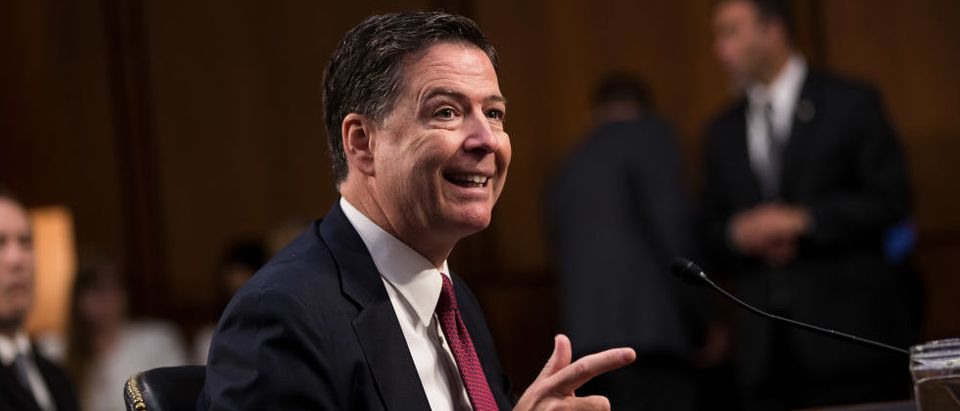Former FBI Director James Comey considered Hillary Clinton’s handling classified information on her private email account to be “grossly negligent,” according to a May 2016 draft of a memo he sent to other FBI officials last year.
But that language was watered down by the time Comey gave a July 5, 2016 press conference in which he announced that he was recommending to the Justice Department that Clinton not be prosecuted in the case.
Comey called Clinton’s email habits “extremely careless” during that press conference.
The change, first reported by The Hill, is significant because gross negligence in the handling of classified information can be punishable by jail time.
“There is evidence to support a conclusion that Secretary Clinton, and others, used the email server in a manner that was grossly negligent with respect to the handling of classified information,” reads a May 2, 2016 statement prepared by Comey.
Comey also wrote in the draft that “the sheer volume of information that was properly classified as Secret at the time it was discussed on email…supports an inference that the participants were grossly negligent in their handling of that information.”
Iowa Sen. Chuck Grassley, the chairman of the Senate Judiciary Committee, referenced the memos in a letter sent Monday to FBI Director Christopher Wray. The committee has been looking into the FBI’s handling of the Clinton email probe.
According to The Hill, Comey sent the rough drafts of his statement to FBI Deputy Director Andrew McCabe, general counsel James Baker and chief of staff James Rybicki. Edits were made on June 10, Grassley says in his letter to Wray.
It is unclear who made edits on Comey’s statement, but Grassley is asking Wray to provide that information to the committee.
In August, the Judiciary committee was informed that Comey had started working on his statement in the Clinton case as early as April 2016, several months before his final announcement clearing Clinton. Republicans leaped on the revelation as evidence that Comey had made up his mind about the case well before the investigation was over.
FBI agents interviewed Clinton on July 2, 2016, just three days before Comey made his well-publicized statement.
“Although we did not find clear evidence that Secretary Clinton or her colleagues intended to violate laws governing the handling of classified information, there is evidence that they were extremely careless in their handling of very sensitive, highly classified information,” Comey said at his press conference.
Comey went on to say that investigators found “evidence of potential violations of the statutes regarding the handling of classified information” but that the bureau determined that “no reasonable prosecutor would bring such a case.”
“In looking back at our investigations into mishandling or removal of classified information, we cannot find a case that would support bringing criminal charges on these facts.”
“All the cases prosecuted involved some combination of: clearly intentional and willful mishandling of classified information; or vast quantities of materials exposed in such a way as to support an inference of intentional misconduct; or indications of disloyalty to the United States; or efforts to obstruct justice. We do not see those things here.”
Clinton used a private email server housed in the basement of her New York residence to send and receive thousands of emails containing classified information, including some containing Top Secret information.
According to the U.S. Code, government officials entrusted with control of documents and information relating to the national defense have committed a crime if “through gross negligence” they permit the information “to be removed from its proper place of custody or delivered to anyone in violation of his trust, or to be lost, stolen, abstracted, or destroyed.”
The maximum penalty for the crime is 10 years in prison.


